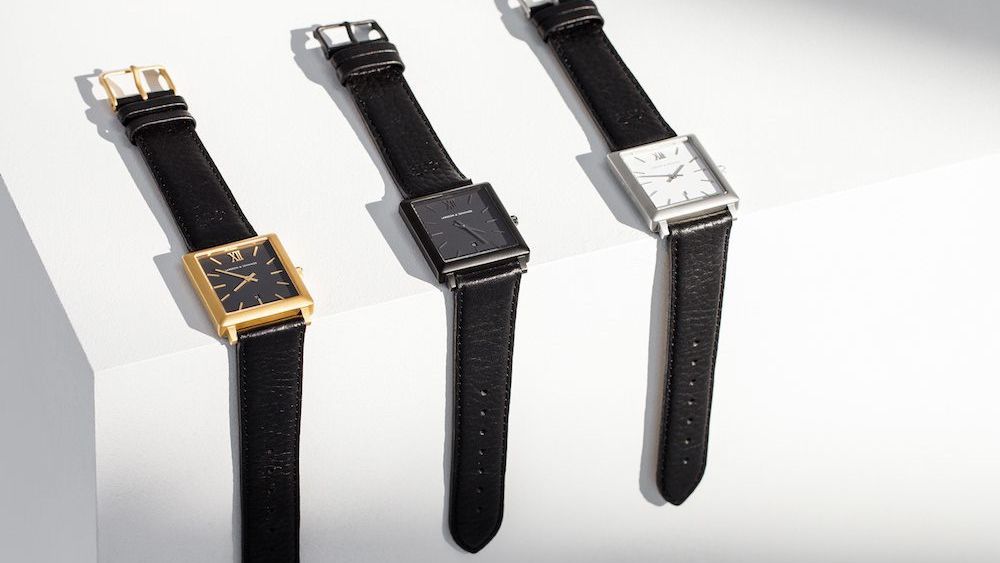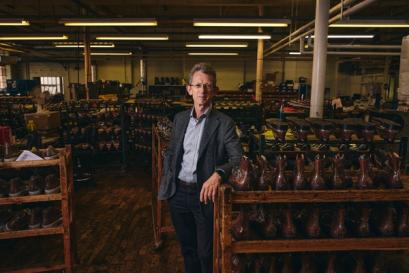

How to start a business with limited funding
We spoke to the founder of Larsson & Jennings about starting a business on a tight budget
- Words: Hamish Roy
Every day, sound business ideas are abandoned for fear that they will be doomed without initial investment. It’s an understandable state of affairs, as for all a person’s confidence in their ideas, there will always be uncertainty when start-up capital is in short supply. Such risk taking is, however, an essential part of entrepreneurship – almost anyone with their own business will tell you that it was founded as much on faith as money. In order to hear from someone who has experienced this first-hand, we spoke to Andrew Jennings, founder and CEO of watch brand Larsson & Jennings.
Founder and CEO, Andrew Jennings
Andrew’s affinity for watches was enkindled at age 10, when he inherited a Rolex Daytona from his uncle. As he grew older, his entrepreneurial streak waxing as he did, Andrew began to take note of a gap in the contemporary watch market. Beginning a career in wealth management, he nevertheless became intent on launching his own watch business on the side. Of course, the process was not without difficulty. Without initial third-party investment, budgets were stretched drum-tight upon launch:
AJ: “When I started Larsson & Jennings, I had a lot of monthly outgoings, a huge mortgage and the first batch of stock in my living room, ready to be sold. I maxed three credit cards and sold my car, but still found myself with a £20,000 debt to pay by April 2012, when the company launched. I was desperate, and reached out to Sotheby’s to put my inherited Rolex up for auction. I remember calling my mum, devastated that I would have to let go of my most prized possession.”
Thankfully, he never did have to part with the heirloom. Instead, he worked tirelessly to fulfil orders, single-handedly turning over £100,000 over the Christmas period. In the New Year, he left his job in the City in order to focus solely on Larsson & Jennings. Today, their watches are stocked in over 100 luxury retailers worldwide; they have one London store and two in New York; and have collaborated with the likes of Harrods, Liberty and Net-a-Porter. It’s an unequivocal story of entrepreneurial success.
The London store on Monmouth Street
GJ: Prior to launch, did you question whether you were prepared for the process of starting a business?
AJ: “Not really. I always knew that I wanted to start my own business, and I always envisioned that it would turn out the way it did. But of course, it started very small – I bought 100 watches from Switzerland which I sold to my friends. And it grew from there.”
Irrespective of the confidence of friends, family and potential investors, it is you that must have real faith in your idea. When difficulties arise – which they will, at one stage or another – and exhaustion and weighty bills are upon you, you will need genuine belief to carry you through. That said, it is also vital to have realistic goals in the short term. By doing so, you will experience more tangible successes, and are more likely to achieve consistent growth over time.
The parts that make up the Saxon watch
GJ: Did you think it important to become familiar with your market?
AJ: “I joined the British horological institute and read a lot of literature on watches. I taught myself a lot – about Quartz watches in particular, which is our focus. You do need to ensure that you spend plenty of time familiarizing yourself with your industry; for me, that meant a lot of self-teaching. You need to become an expert in your field.”
The phrase is a familiar one – ‘focus on what you know’. A blind entrance in to an unfamiliar market is fraught with risk; there may be significant changes imminent in the industry, such as new regulations coming in to effect that could have a drastic effect on a new business. In order to minimise potentially unpleasant surprises, you need to become as familiar with your market as possible.
Larsson & Jennings portable watch studio, which went on tour around Europe.
GJ: Was it a challenge to get good rates as a fledgling business?
AJ: “Definitely. Our first order was very small – around 100 watches – and I had to pay a lot more for them than I would now. I took some convincing before I would go through with it. But you’re continually learning, continually gaining experience. You take that on board, and when you look back at those moments, you see how much you have grown.”
Unfortunately, as the owner of new business yet to make a reputation for itself, you may find that your negotiating position isn’t as strong as you would like. During these early stages, many successful business owners make copious use of their local network, building strong relationships that prove extremely fruitful. This process can be particularly valuable if you find that larger firms are put off by your modest orders.
The new campaign for their latest watch, Norse
GJ: When you first launched, was it difficult to budget for unexpected costs?
AJ: “Of course – and we still get unexpected costs today! Talk to the most famous entrepreneurs – people like Branson, for example – and you can guarantee they’ll talk of the importance of budgeting for the unexpected. When we opened our Bleecker Street store [in New York], for example, it ended up being 30% more than had been forecast. When budgeting, you have to make preparations that allow you to respond to the unexpected.”
When looking to attract your custom, a business will tend to state the absolute minimum in terms of what it might cost you. As a prospective buyer, it’s important to remain realistic, which means acknowledging that some quotes are purely theoretical, and that they will never translate in reality. This trend is perhaps at its most obvious in the world of construction, a highly competitive industry in which firms need to win contracts by promising excellent value for money, which sometimes means quoting unrealistically low prices. One noteworthy example is New York’s One World Trade Centre, which was eight times over budget by the time it was completed. It’s an extreme example, but a poignant reminder to factor in ‘real world’ costs.
GJ: What final piece of advice would you give to a budding entrepreneur based on your experience of launching a brand?
AJ: “I would say that you should take your time when it matters. When I first started, I think it would be fair to say that I rushed one or two things at the very beginning. The watches that I sold to friends weren’t quite the finished product, at least by the standards that I held. That’s certainly something I learnt from – that you should take your time during the moments that matter most.”
With markets as saturated as they are, it is often the finest of details that separate the successful from the less-so. With new competitors ready to spring from the ground at any moment, it can be tempting to rush through product development or begin offering a service before you have established the necessary supply network. To do so can result in early failures. After all the hard work of preparing for a launch, it is usually better to delay a little longer in order to ensure that you are truly ready for business.


